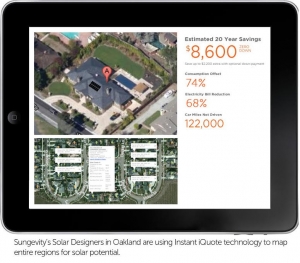
By Roy L Hales
March 13, 2015 (San Diego's east County) - Alec Guettel is back in North Carolina. It has been decades since he obtained his bachelor of arts in Political science from the University of North Carolina at Chapel Hill. Guettel and another of Sungevity’s executives are staying at the local Mariott, while they oversee the company’s entrance into the state. They will also be attending the NC Clean Tech Summit, where Geuttel will be one of the key people in a panel discussion on February 20, 2015. He took my call in his hotel room. In the course of our interview, Guettel said, “we have really positioned ourselves as the partner of choice for utilities.”
He is right, of course, though only one has signed with Sungevity to date. E.on is Europe’s biggest utility and probably the first to recognize that the future lies with renewables. Guettel described their joint pilot project in the Netherlands as “exceeding their expectations.” Though their penetration of the market is “not massive,” it is “gaining traction.”
 “We are seriously discussing going into Germany, but not ready to announce anything yet,” he said.
“We are seriously discussing going into Germany, but not ready to announce anything yet,” he said.
Guettel added, “We are having a lot of conversations with a lot of utilities.”
Though the conflict between utilities and disruptive technologies like solar energy appears to be ending in Europe, it is a Global issue.
Corporations are looking for solutions.
In their news release, Sungevity describes itself as ”the first national solar company to operate in North Carolina.”
This “first” is less important than the partnerships involved with this deal. Guettel said Lowes is the biggest employer in this state, which is important because Sungevity’s services are sold through Lowe’s. In North Carolina, Sungevity has also partnered with Mosiac.
“North Carolina is one of the leading solar markets in the country, but all that is at the utility scale,” said Guettel. “No one has really cracked residential yet because there wasn’t a financing option that lets customers pay as you go and start saving right away.”
Sungevity pioneered solar leasing, which is one of the reasons they spread so quickly through eleven states and DC.
“We had a huge 2014. We nearly doubled again, for the second year in a row. We gained market share and we think we are #3 in terms of market domestically and that doesn’t count our international business,” said Guettel.
 Solar leasing is not permitted in North Carolina law, which is why Sungevity partnered with Mosaic. They created a 20-year loan plan which allows homeowners to take advantage of both the 35% state income tax credit and the 30% federal renewable tax credit for solar customers.
Solar leasing is not permitted in North Carolina law, which is why Sungevity partnered with Mosaic. They created a 20-year loan plan which allows homeowners to take advantage of both the 35% state income tax credit and the 30% federal renewable tax credit for solar customers.
The state incentives are scheduled to expire at the end of the year and it is not certain if it will be offered again, or in what form, in 2016.
“That fairly represents all of us. We hope that it is extended and we don’t have a ton of visibility on whether that will happen or not. We can make a lot of progress this year and hope it will be extended,” said Guettel.
“The overall picture is that the costs of solar keep coming down dramatically year after year. We expect that to keep happening. Over time we be competitive in all states, regardless of subsides.”
According to the North Carolina Sustainable Energy Association’s annual census, the solar sector is expected to grow 34% this year. This does not take into account the arrival of a company like Sungevity. It is starting up in the triangle of Raleigh, Durham and Chapel Hill.
Sungevity partnered with Sierra Club and CREDO. For every installation purchased through these partners, it will provide $750 to the respective organization as part of Sungevity.org, the company’s cause marketing initiative.
Sungevity has three “aces,” which make it a tough competitor in any market:
- An emphasis on serving customers, which extends to financing
- An emphasis on strategic partnerships, which gives it access to resources developed by other companies
- the company’s proprietary iQuote technology, which is why I am quick to agree Sungevity is the partner of choice for utilities.
The data needed for the most recent version is not yet available in North Carolina. Guettel does not know when this will change. He said the old version, which allows customers to obtain a quote within 24 hours is still superior to anything on the market.
The next generation, which produces quotes instantly, made its debut in San Diego and the Bay area last sumer. It is now used in three states, the Netherlands and Australia.
Customers can walk into a Lowes store in San Diego, for example, type their address into a computer and immediately get a quote. All the necessary data - the design of their roof, local influences (like shade from nearby trees) and weather patterns - are already in the computer system.
According to Sungevity’s Chief Technical Officer, Steve Atherton, “We have taken our years of experience of people using our RSD tool to design hundreds of thousands of systems and using LIDAR data … and a lot of very specific software and technology, we can basically now design systems at city scale, state scale and potentially country scale.”
It is the ability to accurately plot the solar potential for systems at city, state and, potentially, national levels that makes this technology so valuable to utilities. It is one of the keys to a solar energy future.








Recent comments